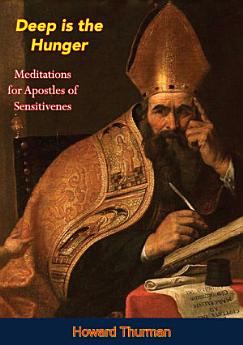Deep is the Hunger: Meditations for Apostles of Sensitiveness
About this ebook
In Deep is the Hunger: Meditations for Apostles of Sensitiveness, Dr. Thurman provides the devotional reader with twenty-five working papers for meditations, which grew out of his weekly messages at The Church for the Fellowship of All Peoples. The book is divided into four parts: (1) A sense of history; (2) A sense of self; (3) A sense of presence; and (4) For the quiet time.
“The attempt is not to set forth a connected series of observations or reflections, but rather to throw a shaft of light on aspects of thought, of life, of religious experience, as they are encountered in the daily round.”—Howard Thurman, Preface
“This is a book of rare quality, indeed, admirably suited for use during the season for personal or group devotions...Dr. Thurman has an unusual and extraordinary gift for using the penetrating word, phrase and illustration...This book and the meditations deal with problems everyone can all relate to...One of the best devotional books of the year.”—Kirkus Review
About the author
Howard Washington Thurman (1899-1981) was an African-American author, philosopher, theologian, educator, and civil rights leader. As a prominent religious figure, he played a leading role in many social justice movements and organizations of the 20th century. Thurman’s theology of radical nonviolence influenced and shaped a generation of civil rights activists, and he was a key mentor to leaders within the movement, including Martin Luther King, Jr. Born on November 18, 1899 in Florida in Daytona Beach, Thurman spent most of his childhood in Daytona, Florida, where his family lived in Waycross. After completing eighth grade, Thurman attended the Florida Baptist Academy in Jacksonville, Florida. He graduated from Morehouse College as valedictorian in 1923. In 1925, he was ordained as a Baptist minister at First Baptist Church of Roanoke, Virginia, while still a student at Rochester Theological Seminary (now Colgate Rochester Crozer Divinity School). He graduated from Rochester Theological Seminary in May 1926 as valedictorian in a class of twenty-nine students. From 1926-1928, Thurman served as pastor of Mount Zion Baptist Church in Oberlin, Ohio. In the fall of 1928, he moved to Atlanta, Georgia, where he had a joint appointment to Morehouse College and Spelman College in philosophy and religion. During the spring semester of 1929, Thurman pursued further study as a special student at Haverford College with Rufus Jones, a noted Quaker philosopher and mystic. He served as dean of Rankin Chapel at Howard University from 1932-1944 and as dean of Marsh Chapel at Boston University from 1953-1965. In 1944, he co-founded, along with Alfred Fisk, the first major interracial, interdenominational church in the United States. Howard Thurman passed away in San Francisco, California on April 10, 1981, aged 81.






